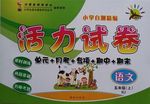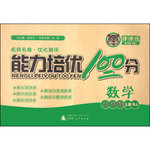题目内容
--- That_______a mistake.
---I don't think so.It_______a mistake.
- A.may be not,must be
- B.maybe,can't be
- C.must be,cannot be
- D.must be,mustn't be
分析:第一个空格的四个选项中A项的not应该在be的前面,B项maybe是副词,C和D项的must be是正确的;第二空格就只需看C和D项,D项的mustn't be是“不许可”,不符合句意,C项can not be是对的。句意是“那一定是个错误。”“我不这么认为,那不可能是个错误。”

 活力试卷系列答案
活力试卷系列答案 课课优能力培优100分系列答案
课课优能力培优100分系列答案
Escaping (逃) from a fire is a serious matter. Knowing what to do during a fire can save a life. It is important to know the ways you can use and show them to everyone in the family, for example, you can use stairways, roofs and fire escapes, but no lifts.
From the lower floors of buildings, to escape through windows is possible. Learn the best way of leaving by a window with the least chance of serious injury.
The second floor window is usually not very high from the ground. An average (平均) person, hanging from the window by the fingertips will have a drop of about six feet to the ground--about the height of an average man. Of course, it is safer to jump a short way than to stay in a burning building.
Windows are also useful while you are waiting for help. Be sure to keep the door closed, before opening the window. Otherwise, smoke and fire may be drawn into the room. Keep your head low next to the window to be sure you get fresh air.
On the second or third floor, the best windows to escape from are those which open onto a roof (屋顶) . From the roof a person can drop to the ground more safely.
【小题1】You can try to escape a fire except _____.
| A.fire escapes | B.lifts | C.roofs | D.stairways |
| A.of no use when a fire breaks out |
| B.useful in putting out a fire |
| C.the only way of escaping a fire |
| D.one of the possible ways of escaping a fire |
| A.it is safer to jump out of the second floor window. |
| B.it is safer to stay in the room. |
| C.the second floor window is too high to jump out of. |
| D.it is the only way to drop out of the window. |
| A.to keep your head high will help you to escape a fire |
| B.it is necessary to keep the door open |
| C.fresh air can’t reach the second floor window |
| D.breathing in smoke might be bad |
American cities are similar to other cities around the world: In every country, cities reflect(反映)the values of the culture. American cities are changing, just as American society is changing.
After World War Ⅱ, the population of most large American cities became smaller; however, the population shifts(转移)to and from the city reflect the changing values of American society. In the late 1940s and early 1950s, city residents(居民)became richer. They had more children so they needed more space. They moved out of their flats in the city to buy their own homes. They bought houses in the suburbs(郊区).
Now things are changing. The children of the people who left the cities in the 1950s are now adults. Many, unlike their parents, want to live in the cities. They continue to move to Sun Belt cities and older ones of the Northeast and Midwest. Many young people are moving back into the city. They prefer the city to the suburbs because their jobs are there; or they just enjoy the excitement and what the city offers.
This population shift is bringing problems as well as some advantages. Countless poor people must leave their flats in the city because the owners want to sell the buildings or make flats for sale instead of for rent(租金). In the 1950s, many poor people did not have enough money to move to the suburbs; now many of these same people do not have enough money to stay in the cities.
Only a few years ago, people thought that the older American cities were dying. Some city residents now see a bright, new future. Others see only problems. One thing is sure: many dying cities are alive again.
【小题1】The main idea of the passage is _________.
| A.cities around the world |
| B.the dying cities |
| C.the changing American cities |
| D.the changing of the American culture |
| A.Because older American cities were dying. |
| B.Because they were richer and needed more space. |
| C.Because cities included the worst parts of society. |
| D.Because they could hardly afford to live in the city. |
| A.are faced with housing problems |
| B.are made to move to the suburbs |
| C.want to sell their buildings |
| D.need more money for daily costs |
| A.American cities are changing for the worse |
| B.the population is getting smaller in older American cities |
| C.many people are now moving from American cities |
| D.people have different views on American cities |
One day, a farmer was walking along a road with his son Thomas. The father said, “Look! There’s a horseshoe, pick it up and put it in your bag.” Thomas said, “It isn’t worth the trouble.” His father said nothing but he picked it up himself. When they got to a nearby town, they had a rest. There the farmer sold the horseshoe and with the few pennies he bought some cherries(樱桃).
The father and the son continued their way. The sun was well up in the sky, and there wasn’t a house or even a tree where they could have a rest. Thomas felt too thirsty to walk on. At this time, his father dropped a cherry on the ground and Thomas picked it up quickly and ate it. After a while, his father dropped another cherry and once again, his son lost no time in picking it up and putting it in his mouth.
And so they went on. The old farmer dropped the cherries and the son picked them up. When Thomas had eaten up all the cherries, his father said to him, “My dear son, if you had bent(弯腰) down early to pick up that horseshoe, it would not have been necessary for you to bend so many times for the cherries. Always remember the lesson that he who does not worry about the little things will find that he cannot do the great things.”
【小题1】Who picked up the horseshoe at last?
| A.The son. |
| B.The father. |
| C.Both the father and the son. |
| D.Neither the father nor the son. |
| A.some bread | B.some water |
| C.some cherries | D.some pennies |
| A.he wanted to teach his son a lesson |
| B.he wanted his son to do more exercise |
| C.he wanted his son to eat them all |
| D.he wanted to laugh at his son |
| A.cherries are so delicious that most of us like to eat them |
| B.a horseshoe is so expensive that it can bring us a lot of money |
| C.if we want to eat cherries, we must pick up a horseshoe |
| D.if we don’t worry about the little things we cannot do the great things |

Four girls were at the same school. They were good friends, so they often studied and played together. They went to school every day by taxi.
One day one of the girls said, “There is a test this morning. Let’s go to school late. Then we won’t have to take the test.” “What can we tell the teacher?” One of the girls said. “He’ll be angry. We’ll need a good excuse.”
The girls thought for several moments, then one of them said, “Let’s tell him that our taxi had a flat tire(爆胎).” “That’s a good idea,” the other girls said. “We’ll tell him that.”
They arrived at school an hour later. The test was finished.
“Why are you late?” the teacher asked. “You miss the test.” “Our taxi had a flat tire,” one of the girls said.
The teacher thought for a moment, then he said, “Sit down, one of you in each corner of the room.” The four girls did this. Then the teacher said, “Write the answer to this question on a piece of paper: Which tire was flat?”
【小题1】The four girls went to school every day by ________.
| A.bus | B.taxi | C.subway | D.bike |
| A.didn’t like their teacher | B.got up late in the morning |
| C.didn’t want to take the test | D.had an accident on the road |
| A.对不起 | B.请假 | C.借口 | D.请示 |
A. | B. | C. | D. |
| A.the teacher was always angry with his students |
| B.the teacher would get the same answer to the question from the four girls |
| C.the four girls always have good ideas |
| D.the teacher was strict with his students |